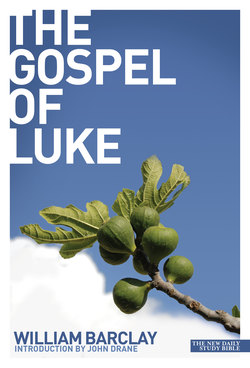Читать книгу Gospel of Luke - William Barclay - Страница 38
На сайте Литреса книга снята с продажи.
ОглавлениеTHE CONDITIONS OF A MIRACLE
Luke 5:1–11
Jesus was standing on the shore of the Lake of Gennesaret while the crowds pressed in upon him to listen to the word of God. He saw two boats riding close to the shore. The fishermen had disembarked from them and were washing their nets. He embarked on one of the boats, which belonged to Simon, and asked him to push out a little from the land. He sat down and continued to teach the crowds from the boat. When he stopped speaking, he said to Simon, ‘Push out into the deep water and let down your nets for a catch.’ Simon answered, ‘Master, we have toiled all night long and we caught nothing; but, if you say so, I will let down the nets.’ When they had done so they enclosed a great crowd of fishes; their nets were torn with the numbers; so they signalled to their partners in the other boat to come and help them. They came and they filled both the boats so that they began to sink. When Simon Peter saw this he fell at Jesus’ knees. ‘Leave me, Lord,’ he said, ‘because I am a sinful man.’ Wonder gripped him and all who were with him at the number of fishes they had caught. It was the same with James and John, Zebedee’s sons, who were partners with Simon. Jesus said to Simon, ‘From now on you will be catching men.’ So they brought the boats to land and they left everything and followed him.
THE famous sheet of water in Galilee is called by three names – the Sea of Galilee, the Sea of Tiberias and the Lake of Gennesaret. It is thirteen miles long by eight miles wide. It lies in a dip in the earth’s surface and is 680 feet below sea level. That fact gives it an almost tropical climate. Nowadays it is not very populous but in the days of Jesus it had nine townships clustered round its shores, none of fewer than 15,000 people.
Gennesaret is really the name of the lovely plain on the west side of the lake, a most fertile piece of land. The Jews loved to play with derivations, and they had three derivations for Gennesaret all of which show how beautiful it was.
(1) From kinnor, which means a harp, either because ‘its fruit is as sweet as the sound of a harp’ or because ‘the voice of its waves is pleasant as the voice of the harp’.
(2) From gan, a garden, and sar, a prince – hence ‘the prince of gardens’.
(3) From gan, a garden, and asher, riches – hence ‘the garden of riches’.
We are here confronted with a turning point in the career of Jesus. Last time we heard him preach he was in the synagogue; now he is at the lakeside. True, he will be back in the synagogue again; but the time is coming when the door of the synagogue will be shut to him and his church will be the lakeside and the open road, and his pulpit a boat. He would go anywhere where people would listen to him. ‘Our societies’, said John Wesley, ‘were formed from those who were wandering upon the dark mountains, that belonged to no Christian church; but were awakened by the preaching of the Methodists, who had pursued them through the wilderness of this world to the Highways and the Hedges – to the Markets and the Fairs – to the Hills and the Dales – who set up the Standard of the Cross in the Streets and Lanes of the Cities, in the Villages, in the Barns, and Farmers’ Kitchens, etc. – and all this done in such a way, and to such an extent, as never had been done before since the Apostolic age.’ ‘I love a commodious room,’ said Wesley, ‘a soft cushion and a handsome pulpit, but field preaching saves souls.’ When the synagogue was shut Jesus took to the open road.
There is in this story what we might call a list of the conditions of a miracle.
(1) There is the eye that sees. There is no need to think that Jesus created a shoal of fishes for the occasion. In the Sea of Galilee there were phenomenal shoals which covered the sea as if it was solid for as much as an acre. Most likely Jesus’ discerning eye saw just such a shoal and his keen sight made it look like a miracle. We need the eye that really sees. Many people saw steam raise the lid of a kettle; only James Watt went on to think of a steam engine. Many people saw an apple fall; only Isaac Newton went on to think out the law of gravity. The earth is full of miracles for the eye that sees.
(2) There is the spirit that will make an effort. If Jesus said it, tired as he was Peter was prepared to try again. For most people the disaster of life is that they give up just one effort too soon.
(3) There is the spirit which will attempt what seems hopeless. The night was past and that was the time for fishing. All the circumstances were unfavourable, but Peter said, ‘Let circumstances be what they may, if you say so, we will try again.’ Too often we wait because the time is not opportune. If we wait for a perfect set of circumstances, we will never begin at all. If we want a miracle, we must take Jesus at his word when he bids us attempt the impossible.
